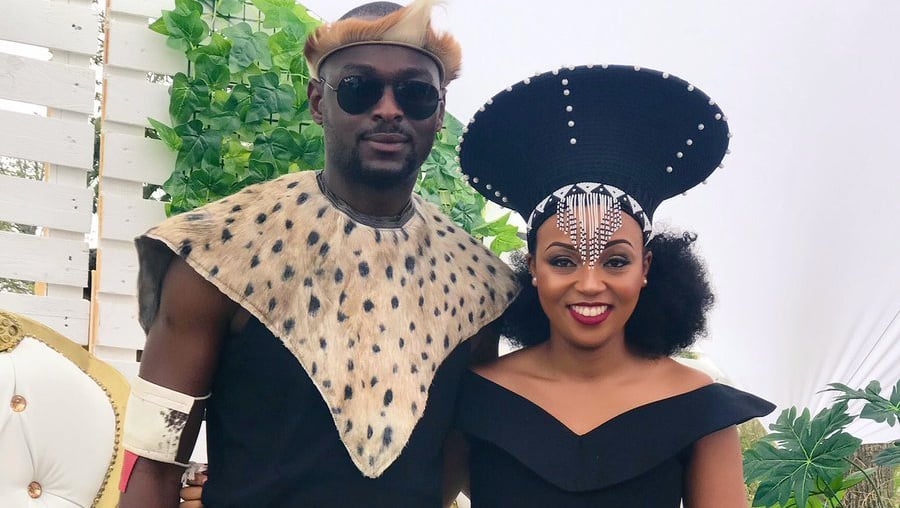
Our social media feeds continue to be filled not only with ravishing brides but brides and their spouses celebrating beautiful traditional wedding ceremonies.
We love the bright Tsonga gowns, textured Zulu attire, Xhosa bead work and everything in between. This sparks the question: are young black women embracing traditional weddings? And if they are, do they still want the white dress and the ceremony that comes with it?
One could argue, ‘of course they are. Celebrating your culture and heritage is not a trend’. Or ask, ‘what’s wrong with enjoying the best of both worlds?’. These are valid points, because a significant number of weddings this past season have included both a traditional and white wedding. So what's the real story?
Over this past festive season, brand strategist and the ever-so-stylish Siyanda Dzenga tied the knot with her husband in a traditional affair in the Eastern Cape. To her, a traditional wedding was an opportunity to honour and celebrate her heritage.
“It’s what I was exposed to growing up, especially growing up in the Eastern Cape. I don’t feel like you can get that kind of celebration and jubilee anywhere else and just to honour who you are as Xhosa people or as Africans,” she says.
Siyanda says a traditional wedding was a given for her.
“If I were to choose between having a white wedding and traditional wedding I would [choose traditional wedding] but my husband in is not Xhosa, he’s Shona, so it wouldn’t be fair to just have one,” she adds.
She says a traditional wedding is firstly “just purely to honour who we are as Africans and, secondly, it’s the way that we celebrate, it’s so unique to us.
“In a white wedding it’s expected to be a perfect wedding but when it comes to traditional it’s less ‘structured’ I guess, and it’s more about the actual celebration. It’s quite an [example] of community upliftment as well.”
READ MORE: Can you be a feminist and still practice lobola?
She recalls how her wedding transcended an extravagant celebration as a community affair where children, extended families, friends and neighbours could join in on the celebrations. It was a multicultural communal affair. “The village comes to celebrate the child they’ve raised.”
“I can’t tell you… traditional weddings are amazing.”
READ MORE: Customary law – know your rights
“I think [a traditional wedding] is also for honouring parents because that’s what they did… My parents were SO honoured and so happy that I did this and did it in the way I did,” says Siyanda.
Gugu Mkhize, a lecturer at the University of KwaZulu-Natal with expertise in terminology, heritage and culture, echoes Siyanda’s point: “The western [wedding] is about two individuals, among Africans it’s about the family.”
But Gugu also says often when it comes to which one is chosen, parents often make the decision for their children to get married in a traditional way.
And in terms of the way traditional weddings are run, she says: “It differs because our culture now is driven by how powerful the family is – which [traditions] the family leans towards - western or traditional beliefs.”
She adds that the way traditional weddings are celebrated has evolved over time, particularly when it comes to costs.
READ MORE: It's time to adapt the songs we sing about lobola and what being a makoti means today
Siyanda agrees the practice of traditional wedding has changed: “I do think we still uphold it quite well, [but] we have [also] modernised it because people go through changes – they will have décor [for example] – and there’s nothing wrong with modernising something as long as the value is not lost.”
Wedding season has us dreaming of planning our own weddings. So which wedding ceremony would you prefer? You can tell us why in the comments.
— W24.co.za (@W24_SA) December 18, 2018
“Because I live in Durban I seen Indians doing the same thing as us, where there is an Indian wedding where they wear a sari and a white wedding where they wear a gown. So I don’t think it will fade away, says Gugu.
And Siyanda, like many other young women will follow up the traditional celebration with a white wedding that she is currently preparing for.
Nothing wrong with the best of both worlds.
Sign up to W24’s newsletters so you don't miss out on any of our hot stories and giveaways.




 Publications
Publications
 Partners
Partners










